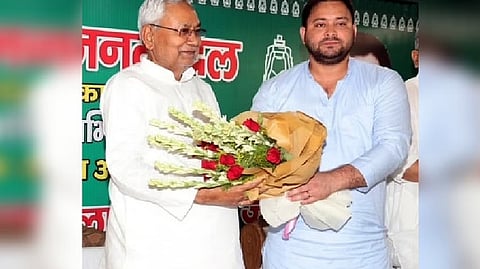

Nitish Kumar has done it – once again. At one level, the Bihar Chief Minister’s move to dump the BJP and realign with the RJD is in character with his chameleon-like politics over the last decade. But on India’s political highway, paved with a road that makes survival and forward momentum challenging, and where U-turns are abundant, the political question will probably be privileged over the moral one. Has Nitish made a smart move?
The full answer to the question will lie in the near future, revealing itself at least by the general election in 2024. What is clear at this juncture is that the decision to pull the plug on his own government, only to have it otherwise refitted, is not bereft of strategic reasoning. The origins of Kumar’s discontent go back to 2020, when the BJP won 31 more seats than the JD(U). Although Kumar was made Chief Minister, the verdict – echoing Maharashtra, where a waning Shiv Sena was unsettled by the BJP’s forward momentum – sowed the seeds in the JD(U) mind that, in the long run, its alliance partner was more competitor than comrade.
The number of irritants in the relationship since then – ranging from the Agnipath scheme to the BJP’s alleged cultivation of Union minister RCP Singh as a possible counter-weight to Kumar – only helped to firm up the switch. It is also a well-known secret that Kumar’s real ambitions lie in Delhi, and that his gambit is calculated to emerge as a possible prime ministerial candidate on behalf of a united opposition. Coming as he does from Bihar, the Hindi heartland, he is better placed than Bengal’s Mamata Banerjee, who also nurses such ambitions. He is also more acceptable to the Congress than her, an important attribute.
But in the meantime, much will depend on how Kumar manages Tejashwi Yadav in the run-up to 2024. The JD(U)-RJD relationship, despite the new-found bonhomie, has been far from cordial, with Kumar having accused Yadav of corruption in 2017, before he switched to the BJP. The RJD, given its recent performance and its strong Yadav vote base, is also a much bigger party – a reality that Nitish Kumar will have to live with in the run up to 2024.
As for the BJP, this is the third major party – the other two being the Akali Dal and the Shiv Sena – that has left the NDA in recent times. But the JD(U)’s departure is easily the most significant. With 40 seats, and the creation of a powerful Mahagathbandhan, the BJP will find the going very tough in Bihar. From all appearances, the NDA in 2024 will not be the same one that fought 2019, which is made up now mainly of minor parties and a few like the AIADMK, with which it shares an uneasy relationship.
The BJP’s problems with allies are partly a result of shabby political management and partly a result of its own growth, which has engendered feelings of insecurity. From the point of view of the anti-BJP opposition, the developments in Bihar – which follow the collapse of the Shiv Sena and its government in Maharashtra – is the best news it has had in a very long time. How it can use this to make an impact in 2024 is the big question.
Visit news.dtnext.in to explore our interactive epaper!
Download the DT Next app for more exciting features!
Click here for iOS
Click here for Android